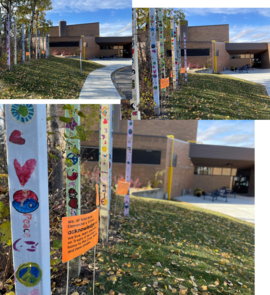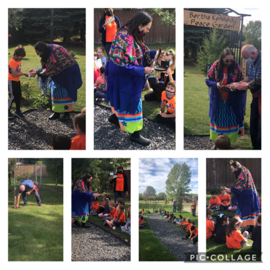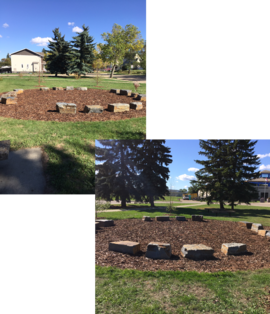School Council ReconciliACTION

The Peace Pole Project - Wild Rose School (WRS) (St. Albert Public Schools)
This was part of St Albert Public's commitment to Truth and Reconciliation supported by the District's Wisdom and Guidance Committee.
Continuing work on the Calls to Action and to build confidence and competence in preparation of the implementation of the new Teacher Quality Practice Standards relating to Foundational Knowledge about First Nations, Métis and Inuit peoples and histories, schools were asked to commit to a project.
Wild Rose School selected the Peace Poles as part of their learning journey.
The objective was to create a pole, or poles, that would represent peace and what it means to the school. The message of peace, intentions and hopes are shared with all who read them. The messages can be demonstrated through words and/or drawings.
While creating the words and symbols that represent peace and harmony to the school, we think about recognition of differences, the ties of the earth that First Nations, Métis and Inuit have taught us, and the reconciliation and forgiveness needed for those who were misunderstood and mistreated.
More information on peace poles can be found at https://www.peacepoleproject.org/
As part of our acknowledgement of the National Day for Truth & Reconciliation, here is what was shared with students at WRS:
The students of Wild Rose made these Peace Poles many years ago, to show our community that they were committed to living peacefully on this land, and to living peacefully with others. Our school has put them here, and created this space on our grounds, to be a place of peace and a reconciliation for everyone in our community.
In our school, we are committed to learning the truth about the history of our First Nations, Métis and Inuit communities in Canada.
As we walk from here into the world, we are committed to creating opportunities for reconciliation, repair of harm and restored relationships.
Sally Rudakoff, Assistant Principal
Wild Rose Elementary School
Bertha Kennedy Peace Garden

Bertha Kennedy Community Catholic School had the honour and privilege to welcome Hazel McKennitt (Indigenous Knowledge Keeper) and Archie Arcand (Métis Elder) to smudge our newly planted Peace Garden.
The Bertha Kennedy Peace Garden started when two Bertha Kennedy staff members, who attended the First Nations, Métis and Inuit Advisory Committee, decided they wanted to do something as a school community to show Bertha Kennedy’s support and commitment to Truth and Reconciliation.
We decided on our Peace Garden - which would be four (4) trees planted in the four (4) directions of the medicine wheel. One tree was donated by a community member and then three more were bought by our school council. We had the idea to plant shrubs connecting the four trees which would then complete the circle, but funds were not available. We were disappointed not to be able to complete the design as we had hoped this project would help the students continue to develop an appreciation and respect for Indigenous culture and ways.
Upon hearing of the City of St. Albert Environmental Initiatives Grant Project, I wrote up the grant proposal which would enable us to complete the Peace Garden and to include a pathway which would run through our orchard (apple trees --from school council, a cherry tree--donated from one of our Bertha Kennedy parents, and a plum tree donated from Holes) and connect with our new vegetable garden. Our previous garden was in need of repair and was a distance away. The design of the Peace Garden allows all the components of the garden to flow from one to another.
Nicole Baker, M.Ed. Principal
Bertha Kennedy Catholic Elementary School
175 Larose Drive, St. Albert, AB T8N 2G7

Such a simple, yet impactful, way of advancing reconciliation!
Elk Island Public Schools celebrates official opening of land-based learning spaces
Friday, September 17, Elk Island Public Schools (EIPS) celebrated the official grand opening of land-based learning spaces at Division schools.
As one component of First Nations, Métis and Inuit education in EIPS, land-based learning spaces invite students, staff and community members to sit with and on the land and listen to the story it shares. They are spaces of reflection and connection—with ourselves, with each other and with the earth.
